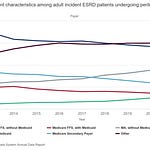Summary
In Part 4 of our conversation, we explore the concept of value-based care (VBC) in the healthcare system, emphasizing its importance in addressing patient needs and costs. We talk about the challenges faced by physicians in adapting to VBC, the impact of cost awareness on patient care, and the potential benefits of VBC in reducing physician burnout and improving job satisfaction. Alice and Eugene also share insights on the transition from fee-for-service models to VBC, advocating for a more holistic approach to patient treatment.
Guest Bio
Eugene Lin is a nephrologist and health economics researcher who focuses on the impact of public policy and federal regulation on kidney care, the provision of dialysis in public and private insurance markets, and transitions of care for patients with kidney disease. He currently serves as an Assistant Professor of Medicine at the University of Southern California (USC). Eugene's research has been featured in high-impact publications such as JAMA, JAMA Internal Medicine, and Health Affairs. His expertise lies in analyzing how value-based care models impact the delivery of kidney care and patient outcomes, making him a key voice in the conversation about healthcare reform.
This edition of Signals was made free for all readers thanks to Roivios, the team developing the world’s first renal assist device. Check out JuxtaFlow, a clinical-stage solution for renal insufficiency. Thanks team!
Keywords
Value-Based Care, Healthcare Efficiency, Physician Burnout, Cost Awareness
Chapters
(00:20) Cost awareness and patient care
(02:23) VBC as a “solution” for physician burnout?
(03:40) The poison pill of FFS documentation
(04:20) Flexibility in VBC documentation
Takeaways
Patients Care About the Cost of Care, Even if Physicians Don’t: While some physicians may not focus on costs, patients do—whether through co-pays, costly hospitalizations, or rising premiums. As providers, recognizing the financial burden on patients is essential to delivering effective and compassionate care.1
Value-Based Care Can Improve Physician Satisfaction and Efficiency: Value-based models encourage efficiency in the healthcare system, reducing administrative tasks and potentially mitigating physician burnout. Done right — by allowing physicians to focus more on patient needs and less on documentation — these models can improve both provider satisfaction and patient care.2
Fee-for-Service Models Burden Physicians with Excessive Documentation: The fee-for-service structure demands extensive documentation, pulling physicians’ attention away from patient care. Providers are often bogged down by administrative tasks, like unnecessary reviews and updates, to meet insurance requirements, which can detract from meaningful patient interactions.3
Value-Based Care Supports Holistic Patient Care: Unlike fee-for-service, value-based care allows physicians to treat patients more comprehensively, focusing on overall health rather than isolated visits. This model fosters a return to a more holistic approach to healthcare, aligning with what many physicians originally sought in medicine.
The Flexibility of Value-Based Models Reduces Bureaucracy for Some Physicians: Providers in value-based systems can document only what’s relevant, such as home visits or specific patient needs, reducing bureaucratic overload. However, physicians should carefully consider the specific requirements of their value-based care arrangement, as some models still involve heavy documentation.
Discussion Topics
Why is it important for physicians to consider the cost of care from the patient’s perspective?
What are the benefits and challenges of a holistic approach to patient health, especially for chronic conditions?
How does focusing on holistic care potentially increase job satisfaction for healthcare providers?
In what ways can value-based care reduce administrative burdens that lead to burnout?
What considerations should providers keep in mind when choosing a value-based care arrangement (e.g. specific documentation requirements)?
Signals is made possible with the generous support of our sponsors. We are grateful to partner with organizations committed to advancing kidney care and innovation: Roivios, 3iveLabs, Dialysis Education Services, and IKONA.
How much and why 2024 premiums are expected to grow in Affordable Care Act Marketplaces — Peterson-KFF Health System Tracker
Addressing the rising cost of health care: The shift to value-based care & value-based care examples — AMA (2024)
Physicians in ACOs Report Greater Documentation Burden — Apathy, et al., AJMC (2024)
PCPs and Quality: Too Much of a Measured Thing — Managed Healthcare Executive (2024)

![Signals From [Space]](https://substackcdn.com/image/fetch/e_trim:10:white/e_trim:10:transparent/h_72,c_limit,f_auto,q_auto:good,fl_progressive:steep/https%3A%2F%2Fsubstack-post-media.s3.amazonaws.com%2Fpublic%2Fimages%2F4d588ac1-7fac-4bd4-829d-fc7b4e8f1326_1512x288.png)

![Signals From [Space]](https://substackcdn.com/image/fetch/w_36,h_36,c_fill,f_auto,q_auto:good,fl_progressive:steep,g_auto/https%3A%2F%2Fsubstack-post-media.s3.amazonaws.com%2Fpublic%2Fimages%2F55686857-6b99-45a6-ac0f-09c9f023f2a0_500x500.png)















Share this post